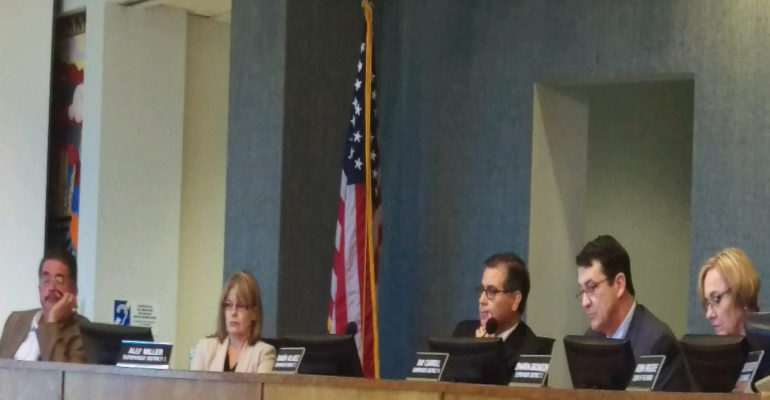
In a stunning and unusual setback, County Administrator Chuck Huckelberry’s plan for taxpayer-paid “incentives” for the agribusiness giant Monsanto was put on the shelf for three months. Expecting the kind of routine quick approval given by the Pima County Board of Supervisors to Caterpillar and World View, Monsanto has already bought 155 acres in the Avra Valley.
The land was purchased from Marana Town Councilmember Herb Kai to build a giant greenhouse for the manufacture of genetically-modified (GMO) corn seeds. The site is near Twin Peaks and Sanders Roads, and groundbreaking was expected before the end of the year. With the BOS unanimously rescheduling a vote for February 21, 2017, Monsanto will likely be forced to put its construction schedule on hold.
Huckelberry’s plan, secretly put together over the last eight months as “Project Corn,” would have sought state approval for a “free trade zone” that would reduce Monsanto’s property taxes by two-thirds. The negotiation was initiated by Sun Corridor Inc. who also provided a supportive analysis. Although requested by the Avra Valley Coalition to recuse herself from the Monsanto issue since she serves on the Chairman’s Circle of Sun Corridor Inc., BOS Chair Sharon Bronson participated and voted.
The company, and Huckelberry, didn’t reckon with the concern of small farmers, local food activists, and Avra Valley residents responding to calls for action by Edible Baja magazine, the Pima County Food Alliance, Heirloom Farmers’ Market and Avra Valley Coalition. Opponents of the secret deal packed the BOS chambers waving signs reading, “Monsanto Poisons for Profit,” “No GMO,” and “Say No to Monsanto.” One speaker, a seven-year-old girl, was quoted saying, “I don’t like Monsanto because it kills bees!”
Supervisor Richard Elias had joined activists in recent anti-Monsanto protests, perhaps responding to the better than 20 percent of the vote for District 5 Supervisor going to Green Party political unknown, Martin Bastidas.
While Tucson-Metro Chamber of Commerce head Mike Varney and Arizona Farm Bureau Representative Jack Mann spoke in favor of the Huckelberry-Monsanto deal, their voices were lost in the angry crowd, some promising civil disobedience if necessary to stop Monsanto..
The bee reference was to Monsanto’s signature product, glyphosate, which has been labeled a “probable carcinogen” by the World Health Organization and heavily restricted or banned in many countries. Glyphosate, the active ingredient in the world’s most heavily used herbicide, Roundup, is responsible for the decline in the monarch butterfly population and linked to colony collapse disorder in bees. Aerial spraying of glyphosate has also sickened residents of the Avra Valley.
Monsanto is not used to being denied. Its nearly $30 million in political campaign contributions over the past 25 years have secured the corporation $146,658,010 in state and local subsidies, nearly half a million in federal grants, and over a million dollars in federal loan guarantees. That is despite having paid out over $85 million in penalties for accounting fraud or discrepancies and health, safety and environmental violations. (Source: Good Jobs First Subsidy Tracker.)
With glyphosate residue from GMO seeds being found in products ranging from breakfast cereals to tampons to childhood vaccines, there is a world-wide outcry against the agribusiness giant, about to become even bigger and more powerful in a $66 billion merger with Bayer. Many believe the US Environmental Protection Agency is less than objective about Monsanto. When it first approved glyphosate most of the studies the EPA cited turned out to be bought and paid for by the pesticide industry. With license renewal put off until 2017, the EPA recently summarily removed a glyphosate critic from the Scientific Advisory Panel that makes the recommendations the EPA will base its decision on.
It’s clear that a lot of people in Pima County don’t want Monsanto as a new neighbor with tax breaks local farmers and property owners can’t get. The Board of Supervisors ducked the issue in the face of organized protest this time. They said they will set up an “Agriculture Science Advisory Committee” to advise them. Whether that committee will be more than just an EPA-style figurehead remains to be seen. Monsanto, and County Administrator Huckelberry, are used to having their way, but there is a new mood in the land. As populist poet Carl Sandburg said many years ago:
The people yes
The people will live on.
The learning and blundering people will live on.
They will be tricked and sold and again sold
And go back to the nourishing earth for rootholds…
The People, yes, The People….
